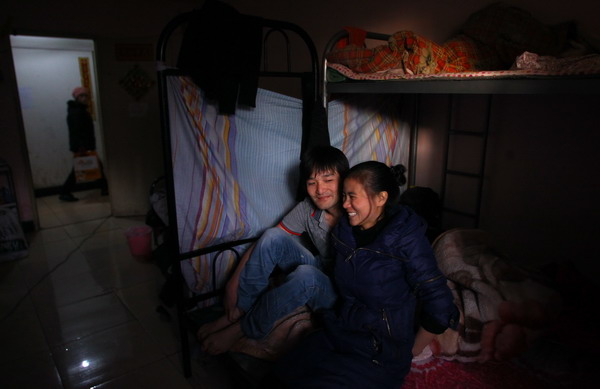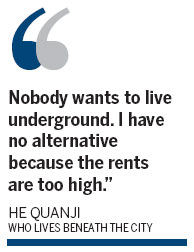Focus
'Mouse tribe' set to be flushed from its lairs
By Li Jiabao and Zhou wenting (China Daily)
Updated: 2010-12-14 09:42
 |
Large Medium Small |
 He Quanji and his wife, from Fujian province, get comfortable in their basement in Chaoyang district. [Photo/Chinadaily] |
The city is looking to dig out its so-called "mouse tribe" - the large population of mainly migrant workers that lives in cramped conditions deep underground.
| ||||
Since the 1990s, against the backdrop of rocketing house prices, the city's civil air defense bureau has been renting out some of the shelters to migrant workers to meet their needs for affordable housing.
"Although it was allowed in the past for us to rent out the civil air defense shelters to companies or immigrants for housing or business, the bureau will now spend three months clearing the residents out from the shelters," said a man named Zhou who leads the construction department at the Beijing Municipal Bureau of Civil Air Defense.
Zhou said the migrants should be gone by March.
He Quanji, 28, and his 22-year-old wife surnamed Bai are typical of those who live beneath the city.
"Nobody wants to live underground," said He, who is from Fujian province. "I have no alternative because the rents are too high."
Their 10-square-meter cellar in the Wangxinhuayuan community of Wangjing is just large enough for four single beds and two tables.
They share the space that is partitioned by a curtain with He's brother and his wife. There are more than 30 such cellars under the community that are serviced by three bathrooms.
A woman surnamed Zhu acts as the local property agent.

"They are not supposed to cook in the cellars for safety reasons," Zhu said. "But I don't give them a hard time because everybody is cooking in their rooms."
She said cellar rooms usually rent for about 900 yuan a month. A similar-sized room above ground would go for 1,400 yuan. Some cellars rent for less.
"The separated cellars in the civil air defense shelter under the neighboring community cost about 300 or 400 yuan a month," Zhu said.
"But those cellars have no windows at all and are only big enough for one single bed."
The poor conditions and safety concerns revolving around such things as a lack of emergency exits prompted the air defense bureau's decision.
"The fire protection bureau does not examine the civil air defense shelters, except before important activities like the Olympic Games," said an unnamed official with the Chaoyang fire protection branch in an interview with Beijing Evening News.
"Since the air defense bureau benefits from rents, it is responsible for safety but it is not qualified in fire protection."
In an article in Beijing News on Dec 6, the chief of the air defense bureau, Wang Yongxin, said the bureau has not approved new leases since Aug 1.
The shelters will be turned over to street committees or township governments and used for such things as underground garages, community entertainment or emergency command centers.
Members of the mouse tribe are wondering where they will find an affordable place to live.
"The capital doesn't only need high-end talents, it also needs low-end laborers," said Hu Xingdou, a professor of economics at the Beijing Institute of Technology.
"We should allow them to reduce their rental costs in some way. There is a floating population of 10 million people in Beijing which makes the existing low-rent housing a drop in the bucket."
Hu said better management of the basements would be a better option than evicting everyone.
"The policy will create a wider gap between those who possess apartments and those who do not," added Yi Shenghua, a lawyer with Beijing Yingke Law Firm. "It may foster a hatred of the rich and even trigger events that harm social stability."
Yi called for the construction of more affordable housing.



